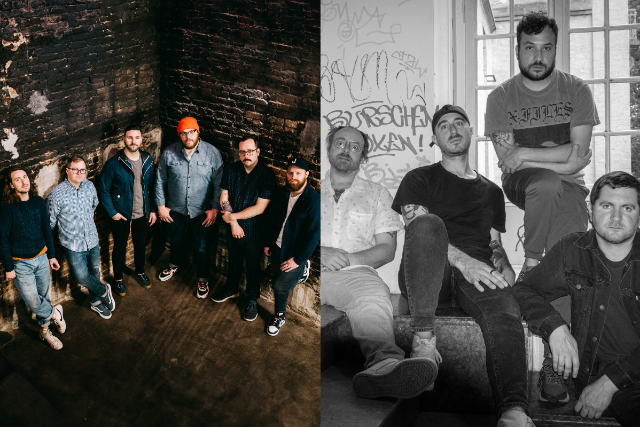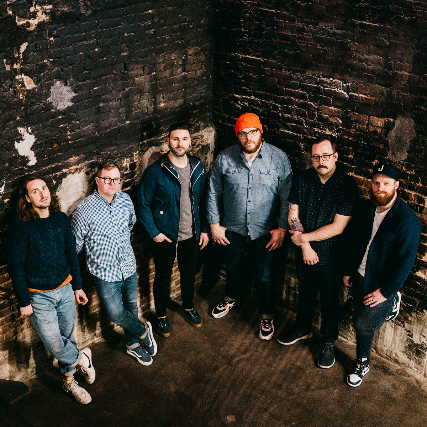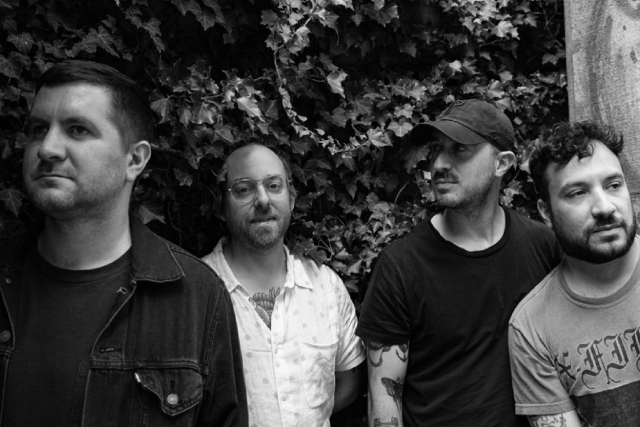TICKET SALES TERMINATED
Tickets are currently unavailable on TicketWeb

The Wonder Years & The Menzingers
Thu, 10 Oct, 7:30 PM CDT
Doors open
6:30 PM CDT
Marathon Music Works
1402 Clinton St, Nashville, TN 37203
TICKET SALES TERMINATED
Tickets are currently unavailable on TicketWeb
Description
Ticket Prices
• Floor [Prices include ALL fees]
- Advance
• Online: $47.05
• At Box Office: $36.05
- Day Of Show
• Online: $52.97
• At Box Office: $41.20
• Lux Loft [Prices include ALL fees]
- Advance & Day Of Show
• Online: $91.75
• At Box Office: $77.25
The Box Office at Marathon Music Works is open every Friday from 10am-4pm.
Address: 1402 Clinton St. Nashville, TN 37203
--
PLEASE NOTE - Marathon Music Works is a cashless venue. Only debit or credit cards are accepted at our bars, box office and guest services window. Please plan accordingly.
PLEASE RIDESHARE - Parking is limited around the venue. We strongly recommend using rideshare apps like Uber or Lyft for transportation to and from the venue. There is a designated rideshare pick up / drop off location near the entrance for your convenience.
--
Need an Access Code? Sign up for our newsletter to get new show announcements, exclusive presale codes, rental discounts and more. Sign up HERE.
*Presale codes are usually sent out on Thursdays at 10am as part of our weekly newsletter.
Event Information
Age Limit
All Ages
Refund Policy
No refunds - no exceptions.

Pop Punk
The Wonder Years
The Wonder Years
Pop Punk
For a number of years, this would have been an almost-blank page. Back in the mid-2010s, a few years after The Wonder Years had first formed in Lansdale, PA, just north of Philadelphia, the band would be asked to provide a bio for events they were playing. All Dan Campbell would write was ‘The Wonder Years is a band’. That was it. They’d then receive the programs for whatever festival or event it was for and laugh. Most bands, the frontman remembers, would write a “full page thing about how their last record charted and ours would just be a blank page with those six words at the top.” A lot of time has passed since then, and a lot has changed, although also not that much, at the same time. If The Wonder Years – completed by guitarists Matt Brasch and Casey Cavaliere, drummer Mike Kennedy, bassist Josh Martin and keyboardist/multi-instrumentalist Nick Steinborn – could get away with a six-word bio, they probably would.
As it happens, when it comes to The Hum Goes On Forever, context is important, which is why you’re reading these words. The most important reason is that this is the first record the band has made since Campbell became a father. And so, when he sings its very first words – ‘I don’t want to die’ – on its very first song, “Doors I Painted Shut”, they shimmer with a little extra poignancy and potency. Because as someone who has sung candidly about how despondent he’s felt at times, thoughts of unexistence are no longer possible. It doesn’t mean they stop, but Campbell can no longer succumb to the abject malaise they induce.
“You’ve got to pull it together,” he says, “because your kids are counting on you. These things that feel hopeless – these massive cultural and societal, full-populace problems like climate change and school shootings, all the things that you’re afraid of for your children – well, they only get fixed if you fix them. ‘I don’t want to die – because I’ve got to protect you.’ It would be very easy to give in to the depression and just kind of lay there, but my kids are counting on me, so I have to try to pull myself together and do the work. ”
That, then, is the crux of this record: his survival is more important than it ever was before. As Campbell phrases it, “How do you take care of someone else that needs you when there are days that you barely want to exist?” Now that he’s a father, the answer is a lot simpler than it used to be. Quite simply, he doesn’t have a choice. Rather, he has to press on against the noise that’s been inside his brain for as long as he can remember. That’s what the ‘hum’ of this album’s title is. Taken from a poem he wrote for Sister Cities, it is, he says, a representation of the gloom he tends to carry with him.
“Even when it’s not constantly in my face,” he admits, “there’s always a low hum of sadness, a low rumbling of ennui. So The Hum Goes On Forever is the understanding that I’m always going to have it, it’s always going to be there, it’s always been there for literal generations of my family and it’s important that I accept that and live and work through it.”
The Hum Goes On Forever, then, is the sound of The Wonder Years navigating those dark, cold waters, bringing that ever-present pulse in the back of Campbell’s mind to vivid life, while also pushing it as far back into his skull as it will go. It’s the kind of effect that’s only achievable through true collaboration and understanding, something that defines how the band has operated from its inception. The six-piece wrote the bulk of these songs in a farmhouse in the middle of Pennsylvania in the winter of 2021. This was before vaccines were widely available, so they all quarantined for 14 days first. Then, after getting vaccinated, they wrote together again in March, April and May, before tracking songs in June. Initially, the idea was to just make an EP with Will Yip, but it instead became their seventh album, finished with Steve Evetts, after the band decided the songs would be under-served on an EP. The result is a record that captures the taught, fraught uncertainty of the period in which they were written, but also travels back in time and memory to uncover and dwell on and inhabit leftover remnants of the past. It serves, too, as a revealing representation of how the six lives that constitute The Wonder Years interact with each other. That happens both inside and outside of the band, obviously, but in terms of the former, they’ve all grown together immensely as musicians. It means the band knows when to be restrained and when to explode, filling in space and emptiness as needed to create a record that mirrors, sonically, the heart-torn urgency at its core, the way these six individuals interact with each other, each an essential component of a greater whole - as well as the next evolution of a band that’s never stopped growing, never stopped striving, never stopped searching for the truth and the heart of this dumb thing we call life.
It would be easy to talk about how specific songs do that, but that would also kind of defeat the point of this record. Because this is a complete journey and should be taken in as such. It begins in August and ends in June and traverses years and decades, as well as the constant cycle of sadness and healing within them. Except it never quite gets there. The hum is never totally shaken off.
“Because the tagline for The Upsides was ‘I’m not sad anymore’,” Campbell explains, “I think people were like, ‘This is the guy who used to be depressed.’ But obviously that never goes away. It’s a constant, and you basically have to co-exist with your sadness. It won’t go away, but that doesn’t mean that people don’t rely on you and that you can stop. As we’ve continued to make records, that’s manifested itself in different ways, but I don’t think ever as clearly as it has on this record. This one is more clearly about me struggling and floundering and drowning at points. In fact, I think it’s maybe even the most revealing in a lot of ways. There’s things I’m singing about on this record that I wouldn’t have had the guts to confront in myself prior to it – like being this open about how low I had gotten, starting in late 2019 and then tumbling into a pandemic, and just thinking and thinking and thinking….”
There’s a lot of thinking on this record. A lot of thoughts. But the main one, the important one, is that very first line of the first song: I don’t want to die. It’s something he repeats and reiterates on final track “You’re The Reason I Don’t Want The World To End”, which addresses the change in Campbell’s purpose since becoming a dad. That’s obvious enough from the title alone, but with the final line – inspired by gardening with his first son during the pandemic – the message becomes truly clear: ‘Put the work in, plant a garden, try to stay afloat.’ It’s a reminder to himself, but it’s also for anyone who listens, anyone who needs it, everyone who’s grown up with the band and has sought, and continues to seek, refuge in their songs. Because, yes, The Wonder Years is a band. But it’s also much, much more than that.

Punk
The Menzingers
The Menzingers
Punk
At this point, the Menzingers are an absolute institution. The Philadelphia punk legends’ multi-decade reputation as road warriors with an unbeatable catalog is cemented as hard truth—and their seventh album, Some Of It Was True, stands as their most immediate-sounding and energetic record to date. The follow-up to 2019’s sensational Hello Exile accomplishes the daunting task of capturing the Menzingers’ distinctive live energy in the confines of the studio, resulting in a sound that’s both rich, raw, and complementary to the group’s increasingly prismatic songwriting approach. More than 15 years in, the Menzingers are still holding their listeners square in the immediate present, and Some Of It Was True documents that power in thrilling fashion.
Some Of It Was True comes after the longest gap between Menzingers records to date—a gestational period brought on by the Hello Exile-era tour schedule’s delays due to the COVID-19 tour industry shutdown. “We weren’t really writing new music yet,” Greg Barnett explains. “We were talking about it, but we were honestly just happy to be out and touring again.” The acoustic reworks of 2020’s From Exile followed, as well as Barnett’s solo record Don’t Go Throwing Roses at My Grave from last year, which was when Some Of It Was True started to come together.
“We turned down any offers at that point because we needed the time to write,” Tom May explains while discussing the writing and recording process, which technically started while on the road and continued in intensive fashion while the boys were back home. “We’d go out on tour, come home, and be in the practice space writing our asses off five days a week,” Barnett says. We had to learn to trust our instincts, which is the hardest thing to do when you’ve been in a band like this for so long. You get caught in your ways! It took a while to trust ourselves, but when we did, it was an amazing feeling.”
Making the process easier: Grammy-nominated producer Brad Cook (Bon Iver, the War on Drugs, Waxahatchee), who joined the Menzingers in El Paso’s legendary Sonic Ranch studios and lent his incredible ear for raw, immediate sound to help the band achieve Some Of It Was True’s in-the-room live feel. “The Menzingers are as real as it gets,” Cook says on his time in the studio with the band. I had an absolute blast working with these guys and was moved to tears many times. They are truly dedicated to artistic growth, and to each other, in ways I found both refreshing and beautiful. I am now a lifer.”
“Brad massively changed the way we were approaching the record,” May says. “We were able to bust out a ton of songs during the last part of the recording process as a result. We’d talk about music and develop a vocabulary about how to work together, and that made us embrace chasing the feeling instead worrying about locking in things immediately.” “We wanted to make a fun record and write songs that we wanted to play live, and that’s exactly what we did,” Barnett adds. “We’ve always said that we want every album to sound live, but we never recorded an album live before. This was the first time we committed to that idea. We wanted to sound like how our band sounds onstage.”
Lyrically, Some Of It Was True is a showcase for how the band’s songwriting has expanded beyond their own personal experiences, drawing from what’s happening around them and the lives of those who keep this world’s lifeforce pumping. “Not everything has to derive from your own life,” Barnett explains. “We have the creative license to look around at our friends and family and write through their perspective. Everyone’s gone through so much.” “We started this band when we were teenagers, and we’ve been at it for a while—and we’re a punk band, which usually represents a lot of youthful energy,” May adds. “We’re getting older now, so the last thing we wanted to do was re-do anything we’ve tried in the past.”
Case in point: The anthemic burn of first single “There’s No Place In this World For Me” clicked into place after Barnett met several fans during a European tour stop who fled from Russia in opposition to the war. “They were the epitome of the song—they had nowhere left to go,” he remembers. “They were my main focus when it came to finishing the song, it was really inspiring.” More broadly, the song addresses the push and pull of life on the road, and how growing older plays into that evolving dynamic: “It’s about that feeling of sitting at home and thinking, ‘How much fun would it be to be in Berlin with your friends right now?’ And you get there and think, ‘Man, I just want to be home.’ The older you get, the more you feel that way, and this song is about trying to find that balance when it comes to where you are in life.”
Elsewhere, “Try” swaggers with a slight power-pop influence, while the May-led “Nobody Stays” soars with a hard-driving edge, as his bell-clear vocals dig deep into the feelings that accompany watching things—and people—disappear over time. “We’ve lived in this city for a long time as we’ve seen people come and go,” he recalls. “Some people, you’ll never see again—or, maybe, even know what happens to them again. Instead of yearning, we’re approaching acceptance of those changes in our lives. I miss a lot of those people, but it’s OK that they’re gone, too.”
The passage of time and how things change are, of course, topics that are always on peoples’ minds—but when it comes to Some Of It Was True, the Menzingers are kickstarting a new era in their already illustrious career by tapping into the energy that brought the band to life in the very beginning. “This record just feels different for us,” Barnett explains. “It’s a really important one in our catalog, and a pivotal moment in our history. We have the liberty of our fans growing with us now, and after writing these lyrical songs about where we are in life, we decided to take other peoples’ stories and make something bigger out of it.”
“It brought us back to our energetic side as a band,” May concurs. “We got to let loose, which is what drew us to the energy of being in a band in the first place. This is a live band—why shouldn’t we record live songs? As a result, we’re back to why we started this band in the first place.”

Indie Rock
Liquid Mike
Liquid Mike
Indie Rock
Liquid Mike is an indie power pop rock band from Marquette, MI, in the Upper Peninsula. Liquid Mike began in 2021 and is the product of Mike Maple’s pop-rock song writing. The band features a cast of U.P. standouts including Monica Nelson, Dave Daignault, Zack Alworden, Cody Marecek. Liquid Mike inhabits a sweet spot in the musical pantheon: catchy, well-crafted guitar and vocal hooks that will snag any fan of power-pop/pop rock. Liquid Mike invokes a relatable feeling of nostalgia with everyday lyrics of the quickly-receding flavor of Big League Chew bubblegum, drinking beer from used marinara sauce jars in college, and every 4th hand rust-bucket of a car you ever drove in a Great Lakes snowstorm. They self-released their fifth LP, “Paul Bunyan’s Slingshot” on Feb 2nd 2024.